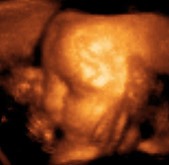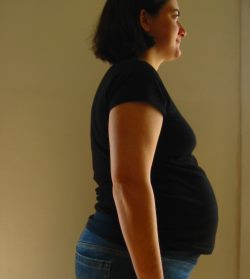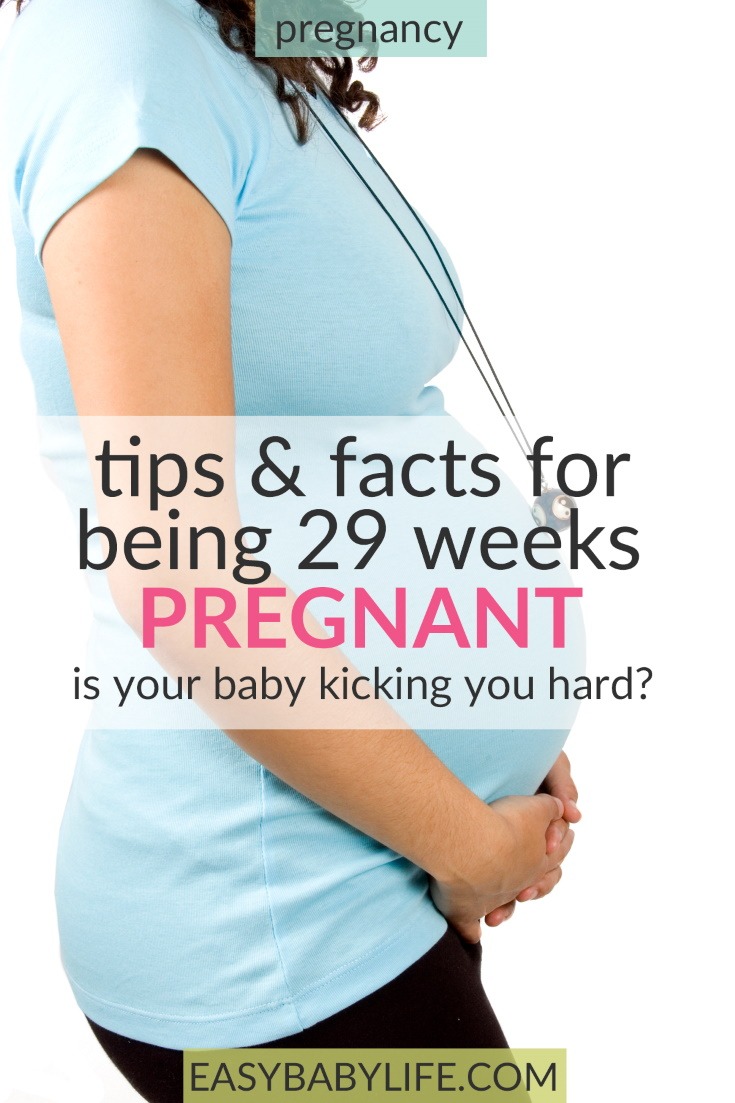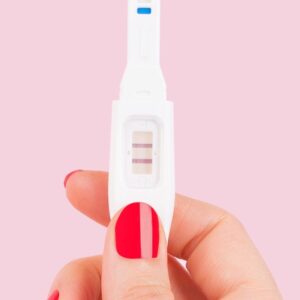When you are 29 weeks pregnant, your baby is growing rapidly in both strength and length; something you may notice by your belly taking all sorts of funny shapes as your baby is kicking and moving around. Here is a hilarious video of such a moving pregnant belly.
Eating healthy continues to be important. To learn more about the benefits of healthy eating during pregnancy, click here.
For mom, it is time to say goodbye to your legs. You are not likely to be able to see them while standing up until after giving birth.
Week 28 | Week 30
What to Expect When 29 Weeks Pregnant?
In this article:
How many months is 29 Weeks Pregnant?
You are now 29 weeks pregnant, which means you are in your third trimester and month 7 of your pregnancy. The end of your pregnancy journey is nearing, and there is not a long way left to go.
Because counting pregnancy weeks and months is often a reason for confusion, we have written a guide on how to count the pregnancy weeks and months and understand the difference between how many weeks/months pregnant you are and what week/month of pregnancy you are in.
Your Baby at 29 Weeks
How Big is my Baby at 29 Weeks?
The fetal age of your baby is now 27 weeks. The baby now weighs about 2.5 pounds (1.2 kg). Your baby is now as tall as your forearm, all the way from the elbow to your little finger, some 15 inches (38 cm). Have a look! Your baby is not so tiny anymore. At this point, the baby is the size of butternut squash.
What Does my Baby Look Like at 29 Weeks Pregnant?
 PinAt this point, your little sweetie is perfectly formed. Your baby is a smaller version of what they will look like after they are born.
PinAt this point, your little sweetie is perfectly formed. Your baby is a smaller version of what they will look like after they are born.
The baby’s fats continue to deposit under the skin – making the previously wrinkled skin smooth. These are the white fats, which actually serve as an energy source for the baby. And this explains why your baby is so energized during this period.
From this point and until they are born, the baby will continue to add fat and muscle.
Fetal development
The muscles are developing further and will continue to do so until birth. The lungs are also becoming more developed and mature but are still not mature enough for life outside of the womb.
The head is bigger than before – this is to allow more space for growth.
Since major developments are taking place, you need plenty of vitamin C, iron, folic acid, and protein to help aid in the normal growth and development of the baby inside your womb.
And since the baby’s bones are also rapidly growing, you need more calcium in your diet to balance the baby’s demands. You can get enough calcium from sources like cheese, yogurt, and milk.
You can feel more vigorous kicks than before. And the baby responds more quickly to light, sound, and movement.
The brain can now control the breathing patterns and body temperature. Your baby’s eyes can move in the sockets.
Your little one is now more sensitive to sound, light, smell, and taste. The buds for permanent teeth are starting to form in the gums.
Mom’s Body When 29 Weeks Pregnant
The Belly
 PinYour tummy is now so big that you might no longer be able to see your legs when you are in a standing position, maybe not even your toes.
PinYour tummy is now so big that you might no longer be able to see your legs when you are in a standing position, maybe not even your toes.
The fact that your baby is getting both tall, heavy, and strong is something you may notice when he or she kicks. If you have a wild kid in your womb, your belly may be taking all sorts of shapes as your baby does the daily workout.
By this time, you should be expecting your baby to move or kick at least ten times in an hour. Of course, babies are not all made equal; some are more active than others.
But if you get worried, try keeping track of your baby’s movements for a couple of hours and discuss the result with your midwife. And remember that even unborn babies do sleep, but usually not for several hours.
If you notice decreased fetal movement or that your baby isn’t moving at all, contact your practitioner.
Watch the video below and compare it with your own belly. Keep in mind that most moms will not experience such extreme belly movements!
Pregnancy Symptoms
If you thought that fatigue is present only in the first trimester, unfortunately, that is not true. Fatigue is a common occurrence in the third trimester too. Your baby and your belly are growing, and your body provides all the nourishment, which takes a lot of energy. Additionally, you might be having trouble resting and sleeping because of different aches and pains.
It is common to feel a bit breathless at this point because the growing uterus pushes up against the diaphragm, which compresses the lungs and makes it harder for the lungs to fully expand when you breathe in. Also, it is not easy for your body to carry that extra weight.
Forty percent of pregnant women develop varicose veins during this time of the pregnancy. These may be of great concern, especially to those who want to wear skirts.
But tell you what, that’s better compared to varicose veins in the rectum or the vulva!
Spider veins are not varicose veins. Don’t get confused. Spider veins are just due to hormonal changes during pregnancy and will fade after the baby is born.
Varicose veins can sometimes be painful, but some experience no discomfort from them. These are said to be hereditary in nature. So, if your mom had them during her pregnancy, then it is most likely that you will have them, too.
Remember that the best way to prevent varicose veins is to avoid sitting or standing for long periods. You can use a support hose and have your feet elevated several times a day.
At this point, you might still experience some of the symptoms that you are already familiar with, but heartburn and constipation are more common during this time.
Ever wondered why all these odd symptoms are common during pregnancy? It is because of your pregnancy hormones. One of them is progesterone.
Progesterone is a smooth muscle tissue relaxant – necessary to prevent early contraction during pregnancy. This hormone relaxes the smooth uterine muscles and the muscles in your gastrointestinal tract, making digestion slower, leading to the accumulation of waste in the large intestine. And remember that the large intestine absorbs water – leading to constipation.
Progesterone also relaxes the valve responsible for backflows of gastric acid, causing the acid to back up, giving that unpleasant and burning sensation or what is commonly known as heartburn. If you experience this at night, talk to your midwife. It is absolutely horrible to wake up at night because of stomach acid coming up. There is medication available even for pregnant women.
A few other things that might make it hard for you to get a good night’s sleep are body aches and pains, such as back, leg, hip pains, and restless legs syndrome.
Some of the body aches and pains are common in pregnancy. Because of your growing belly, an increase in weight, and your joints and ligaments relaxing and getting softer in preparation for delivery, back pain, leg pain, and/or hip pain might occur.
Restless legs syndrome, although it can appear earlier, is especially common during the third trimester. It is characterized by unpleasant sensations of “crawling” or tingling in the legs and an irresistible urge to move the body. This syndrome might be related to iron-deficiency, so make sure to get enough iron in your diet and mention it at your next check-up. To relieve the discomfort, you can try light exercise and stretching.
The constant need to go to the bathroom because the baby is pressing up against your bladder might also make it harder for you to sleep. However, don’t think it means you need to cut down on drinking water. Getting proper hydration is really important for your health, healthy pregnancy and can help you relieve many uncomfortable symptoms, such as hemorrhoids and constipation.
During this time, the chances for preeclampsia are higher than before, although it can also develop earlier in the pregnancy. The main symptom that might point to preeclampsia is elevated blood pressure. Some of the other signs are severe swelling of your legs and puffiness in your face, headaches that don’t go away, blurred vision, as well as nausea and vomiting that are otherwise uncommon at this stage of the pregnancy. If you notice any of these signs, talk to your doctor.
Some women might experience Braxton Hicks contractions. These are uterine contractions that are usually painless and felt only in the front. Unlike true contractions, they begin and remain irregular, do not increase in frequency, duration, and interval, and usually disappear with rest or when you change the position. However, if you think you are experiencing true contractions or are not sure whether they are real or not, contact your doctor.
Things to do and buy this week
Make sure to start attending a prenatal class, preferably together with your partner.
Because your baby is starting to increase their calcium intake during the third trimester as their bones get stronger, make sure you are taking in enough calcium. The same as throughout the whole pregnancy, having healthy and balanced nutrition is extremely important for your and your child’s health.
Maybe you want to use this time to travel one more time before your baby is here. It isn’t too late to fly when you are 29 weeks pregnant. However, it is always best to consult with your doctor first. Your doctor knows how your pregnancy progressed and can advise you on what to keep an eye on or tell you if you need to be extra careful with something. Also, make sure you check with the airline company because different airlines might have different policies.
If you want to prepare your body or your hubby for the big childbirth day, check out these two great video classes on the topic:
- Yoga positions to strengthen and open up your body for childbirth
- Massage techniques and support tools for the birth partner
Week 29 Pregnancy Video
Diary of a Daughter
What’s it really like being 29 weeks pregnant…? Here’s a true diary from
At the visit to the Dr this week, I was dilated again. Not so much; 1 centimeter, but still scary. My cervix had shortened too. The Dr didn’t seem too worried, but I am. Things are not going in the right direction. Better keep staying in bed even if it is boring.
My active little baby now kicks me in the ribs. Ouch!
Are you also 29 weeks pregnant? Please share your experiences and thoughts by leaving a comment below!
Read Next
- Premature survival rates week by week
- All about Braxton Hicks contractions
- Birth stories shared by our readers
Week 28 | Week 30
References:
Preeclampsia
Mayo Clinic, Mayo Clinic Guide to a Healthy Pregnancy
Joanne Stone MD and Keith Eddleman MD, The Pregnancy Bible: Your Complete Guide to Pregnancy and Early Parenthood
Nilsson, L; Hamberger, L. A Child Is Born
Soderberg, L., Mammapraktika. B Wahlstroms.
Image: Image of 29 weeks belly by Graham and Sheila

Paula Dennholt founded Easy Baby Life in 2006 and has been a passionate parenting and pregnancy writer since then. Her parenting approach and writing are based on studies in cognitive-behavioral models and therapy for children and her experience as a mother and stepmother. Life as a parent has convinced her of how crucial it is to put relationships before rules. She strongly believes in positive parenting and a science-based approach.
Paula cooperates with a team of pediatricians who assist in reviewing and writing articles.







